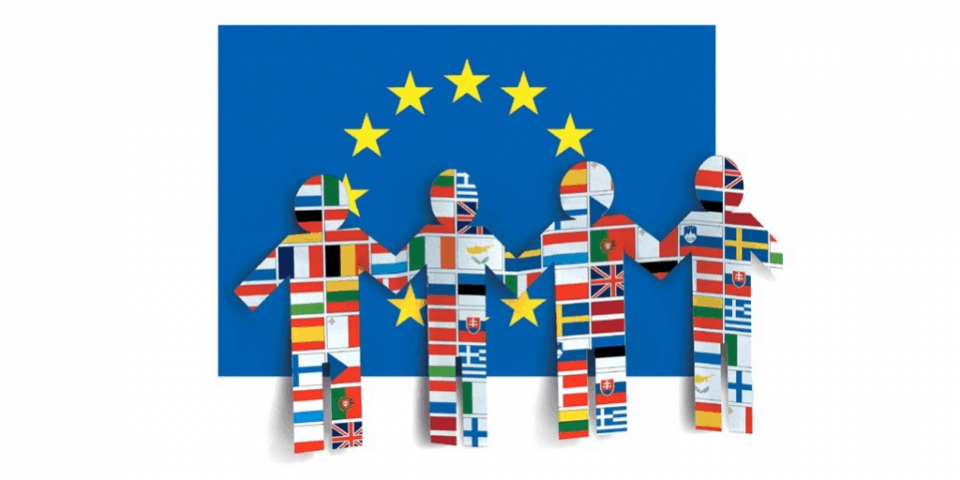Major obstacles still limit the use of its full potential. Italians, Maltese, Swedes, Belgians, French, Bulgarians – no matter which nationality of one of the 28 EU member states you possess, you do also enjoy EU citizenship and the numerous freedoms and opportunities it entails.
However, only one out of two Europeans are fully aware of their status as citizens of the EU and one out of three is not sure about what it actually means. This is surprising and alarming at the same time, as the concept of EU citizenship in itself is not new. Introduced with the Treaty of Maastricht in 1992, it has been steadily developed and constitutionalised by the European Court of Justice .
“And why should there not be a European group which could give a sense of enlarged patriotism and common citizenship to the distracted peoples of this turbulent and mighty continent and why should it not take its rightful place with other great groupings in shaping the destinies of men?“
Winston Churchill, „Let Europe Arise“, Zurich,1946
Union citizenship with additional benefits
Union citizenship is more than a mere copy of national citizenship and complements the latter without replacing it. It confers major rights to Europeans, for example the freedom to live, study and work in another EU country. Freedom of movement, as one of the Four Freedoms, can be considered as the backbone of EU citizenship. But there is more to it, for example when it comes to political participation and shaping the democratic life of the European Union.
“Citizenship of the Union is hereby established. Every person holding
the nationality of a Member State shall be a citizen of the Union.“
Article 20, Treaty on the Functioning of the European Union
In the run-up to the European elections, it is worthwhile to shed some light on EU citizens voting abroad between May 23-26. In theory, following Art. 22(2) of the Treaty on the Functioning of the European Union (TFEU), being a European citizen also means enjoying political rights, especially voting rights. Every EU citizen, including those residing outside their home country, is entitled to vote for their European representatives. However, despite major communication efforts by several EU institutions, activists and political actors, this right is still not exercised as fully as it could be.
Turnout decreasing since 1979
First of all, voting turnout steadily decreased since the first election to the European Parliament in 1979. The problem of a persistenly low turnout is that the European institutional model is based on representative democracy, embodied by democratically elected members of the European parliament (MEPs).

Source: European Parliament
A turnout below 50% means that not even half of all Europeans are actually represented by an MEP which many see as a threat for European democracy, fuelling discussions about the democratic deficit of the EU. Among the non-voters are those who do not want to vote, but as well some people who practically cannot vote or who are simply not fully aware of their rights and national procedures.
“Really?“, you might ask, “but what about those political rights enshrined in Art. 22 TFEU?“ Well, let us take a closer look at it.
Non-citizen residents vs. non-resident citizens
Many of those who do or cannot vote are actually mobile EU citizens, meaning those citizens residing in another EU member state than their home country. In total, 4% of EU citizens of working age live in another EU member state. However, only 8% of those mobile citizens do actually vote in EP elections in that country (non-citizen residents). This is a fairly low number. The reason is that mobile EU citizens are particularly affected by a lack of information and unclarity about their (voting) rights while living abroad. How to register and where to register are among the most frequent questions. Unfortunately, there are no harmonised precedures and requirements among the EU28.
Another reason are different conditions of eligibilty for mobile citizens to vote in their home country (non-resident citizens). While most EU member states offer Embassy vote, Czech, Irish, Maltese and Slovak nationals living abroad are practically disenfranchised because they are not residing in their home country and therefore cannot vote for their national representatives. the same is valid for Italian, Greek and Bulgarian nationals who are residing outside the EU, as shown below:

Source: European Commission
As an alternative solution and to be still able to enjoy the voting rights conferred by EU citizenship, they could vote in the EU country where they are currently residing, if appplicable. Which brings us back to the point of depature: lack of awareness and access to information, especially for non-citizen residents.
With its 2019 communication campaign „This time I’m voting“ , following up on the conclusions drawn in the 2017 EU citizenship report, both the European Parliament and the European Commission aim to close the information gap and to increase the participation of mobile and non-mobile EU citizens in the politcal life of the EU. Enhanced communication by EU institutions is one answer to the problems, but it remains to be seen to what extent such a top-down initiative proves to be successful.
Finally, the current developments and the untapped potential of EU citizenship also hold political parties, NGOs and thinks tanks that are active in political and citizenship education accountable. They can all help to better use the potential of EU citizenship and thus to wake up the sleeping beauty. Because after all, political participation is far more than only participation (EU) elections, it also comprises active engagement in the EU democratic process in citizens‘ daily life.
About the author:
Carmen Descamps is European Affairs Manager at Friedrich Nauman Foundation for Freedom in Brussels.
Interested in the topic of EU citizenship?
1. ELF publication: Living a constitutional life: https://archive.liberalforum.eu/wp-content/uploads/2018/11/Final_constitutional_life.pdf
2. https://www.thistimeimvoting.eu/
